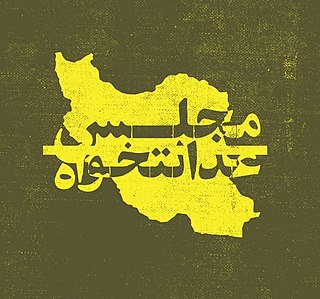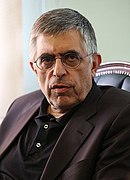
The Iranian parliamentary elections of February 20 and May 7, 2004 were a victory for Islamic conservatives over the reformist parties. Assisting the conservative victory was the disqualification of about 2500 reformist candidates earlier in January.

Presidential elections were held in Iran 17 June 2005, with a second round run-off on 24 June. Mohammad Khatami, the outgoing president of Iran, stepped down on 2 August 2005, after serving his maximum two consecutive four-year terms according to the Islamic republic's constitution.
Iranian City and Village Councils elections, 2003 took place in February 2003, the second time local elections for city and village councils had taken place since being introduced in 1999, and 905 city and 34,205 village councils were up for election.

Legislative elections for Majlis of Iran were held on 14 March 2008, with a second round held on 25 April 2008. Conservatives loyal to President Mahmoud Ahmadinejad were considered the victors of the election, at least in part because "all the most prominent" reformist candidates were disqualified from running.

The parliamentary election for the 9th Islamic Consultative Assembly, or Majlis, were held in Iran on Friday, 2 March 2012 with a second round on 4 May 2012 in those 65 districts where no candidate received 25% or more of the votes cast. More than 5,000 candidates registered but more than a third were disqualified by the Guardian Council leaving about 3,400 candidates to run for the 290 seat representing the 31 provinces.

Parliamentary elections were held in Syria on 7 May 2012 to elect the members of the Syrian People's Council. The elections followed the approval of a new constitution in a referendum on 26 February 2012.

Parliamentary elections were held in Iran on 26 February 2016 to elect members of the Islamic Consultative Assembly for all seats in the 10th parliament in the Islamic Republic era and the 34th since the Persian Constitutional Revolution. A second round was held on 29 April 2016 for some constituencies where candidates failed to obtain the required minimum 25 percent of votes cast. The elected MPs served from 28 May 2016 to 27 May 2020.
The fifth Iranian Assembly of Experts election were held in Iran on 26 February 2016 to elect the members of the Assembly of Experts. All 88 members of the Assembly of Experts, who are known as mujtahids, are directly elected. The elections had been planned for 2014, but were delayed in order for the election to be held alongside the Islamic Consultative Assembly elections.

Presidential elections were held in Iran on 19 May 2017, the twelfth such elections in Iran. Local elections were held simultaneously.

Presidential elections were held in Iran on 18 June 2021, the thirteenth since the establishment of the Islamic Republic in 1979. Ebrahim Raisi, the then Chief Justice of Iran, was declared the winner in a highly controversial election. The election began with the mass disqualification of popular candidates by the Guardian Council, and broke records of the lowest turnout in Iranian electoral history, as well as had the highest share of protest blank, invalid and lost votes despite a declaration by the Supreme Leader of Iran, Ali Khamenei, considering protest voting religiously forbidden (haraam) as it would "weaken the regime." Reporters Without Borders reported 42 cases of journalists being summoned or threatened for writing about candidates, and the chief of the police threatened people who discouraged others to vote.
An election to the Islamic City Council of Tehran took place on 28 February 2003, along with the local elections nationwide.

This national electoral calendar for 2020 lists the national/federal elections held in 2020 in all sovereign states and their dependent territories. By-elections are excluded, though national referendums are included.

Mohammad-Reza Rahchamani was an Iranian physician and reformist politician. From 1984 to 2000, he represented Sabzevar in the Iranian Parliament. During the early 2000s, he headed Iran's State Welfare Organization.

The Campaign for Justice-seeking Parliament or simply the Justice Seekers are a group of conservatives who compiled an electoral list for 2020 Iranian legislative election.

The Coalition of Eight Reformist Parties refers to the political alliance of eight reformist parties that endorsed a joint electoral list for 2020 Iranian legislative election in Tehran electoral district.

The Reformists Coalition was the main electoral alliance of the reformists for 2008 Iranian legislative election.

This national electoral calendar for 2021 lists the national/federal elections held in 2021 in all sovereign states and their dependent territories. By-elections are excluded, though national referendums are included.
Legislative elections were held in Iran on 1 March 2024 for the first round, and on 10 May 2024 for the second round.
The 2024 Iranian Assembly of Experts election were held on 1 March 2024, concurrently with the elections of the Islamic Consultative Majlis. Directly elected by the public from a list of candidates vetted by the Guardian Council, the Assembly of Experts is made up of 88 clerics with the responsibility of supervising the Supreme Leader and selecting a new one.


















